Aston Martin the only choice if Vettel still wants to win
As rumours suggest Sebastian Vettel is contemplating an Aston Martin F1 contract for 2021, Damien Smith says that it's a better option than taking a sabbatical in the hope that something better comes around
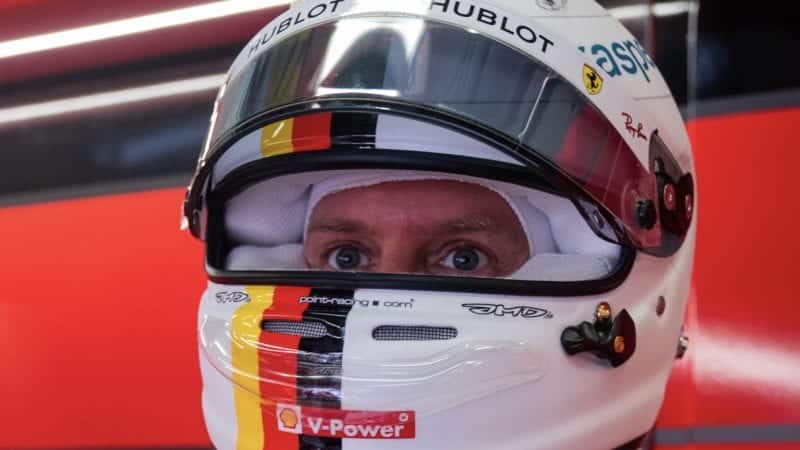
Ferrari has flat rejected (and ejected) him; Renault has favoured old flame Fernando Alonso; Mercedes appears to be politely looking the other way; but Racing Point, soon to be Aston Martin, is reported to have offered him a contract, even if the accomplished Sergio Perez sits in one car with two years still left on his contract, and the ‘manager’s son’ sits in the other. As it stands, the situation at the team currently in the pink, in more ways than one, remains opaque.
Where else could he go? Haas? Surely not… Alfa Romeo? Why? There’s no way back to Red Bull, or so they say. What about AlphaTauri (née Toro Rosso) where it all began when he pulled off that astonishing mixed-weather win at Monza in 2008? He was just 21 years old back then (in the context of today, a veteran!), but all these years later, it’s still just Red Bull’s B-team. That would feel a bit desperate.
So Aston Martin? For a man of Sebastian Vettel’s standing there’s an element of risk, but Lawrence Stroll’s millions are tempting, there’s the lustre of the team’s new manufacturer status and, most importantly, the bonding relationship with Mercedes, which has elevated the team back to the top of the midfield squabble this season. It’s more than a decent option, given what else is – or more specifically isn’t – on offer.
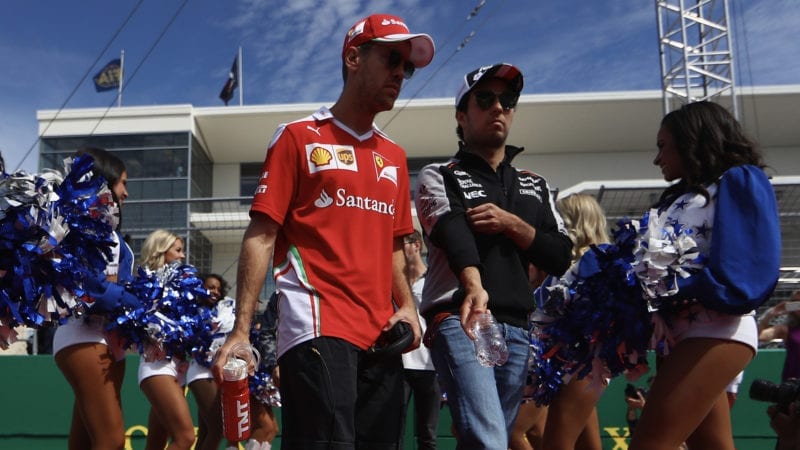
Sebastian Vettel is rumoured to be replacing Perez at what will be Aston Martin in 2021
Getty Images
As his old boss Christian Horner said at the weekend, a sabbatical appears to be Vettel’s other obvious choice. Retirement? From what he’s said, Vettel’s not ready for that. The man is only just 33, a four-time world champion who has won more grands prix than anyone, bar Michael Schumacher and Lewis Hamilton. Then again, the downward spiral of his career, as mistake has piled upon mistake, has become painful to watch, and in his final season with Ferrari he’s even been lumbered with a hound of a Prancing Horse. Vettel is a decent, intelligent, apparently sensitive man, who has three young children and all the material wealth to give them the very best starts in life. There’s almost an urge right now to scream at him: ‘Get out! Do something else!’
But Vettel is also defiantly proud and, like all of us, has an ego. Racing drivers are a long time retired, so why should he walk away at such an age? Especially when he’s still fast when the opportunity arises and apparently still enjoys the most important aspect of F1 life: the bit in the cockpit.
Clearly, there are a lot of ‘ifs’ at play. If Vettel is still hungry, if his self-belief really is still intact despite his pains at Ferrari and if there really is an Aston Martin deal on the table, he’d probably best sign it. A sabbatical doesn’t necessarily mean the end, as it was for Mika Häkkinen, whose year-off became retirement mid-2002, and Alonso is clear proof that there is a way back. But even when they do work out, the results of a sabbatical can be bitter-sweet.
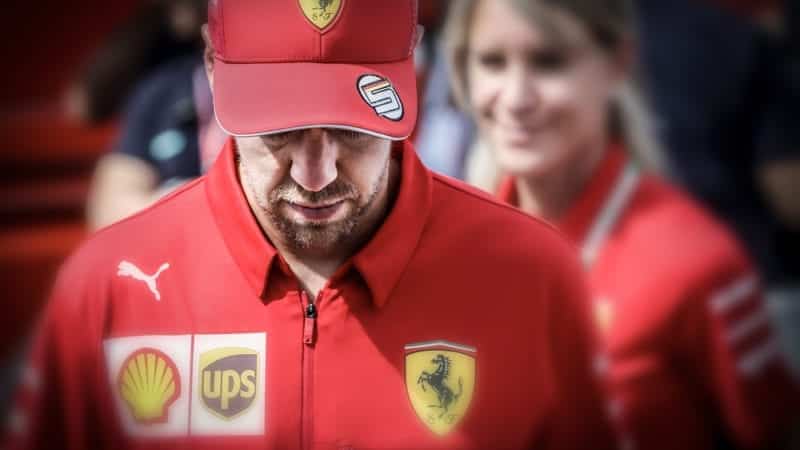
Focused or fed up? Aston Martin the logical choice if Vettel wants to keep racing
Jean Michel Le Meur / DPPI
Alain Prost was 36 and a three-time champion when he endured his miserable final season at Ferrari in 1991, a first winless campaign since his rookie year at McLaren in ’80. The year before he’d been a filthy Ayrton Senna professional foul away from a fourth title, but now found himself fighting for scraps as Nigel Mansell grazed the heavens in Williams FW14B. The ‘Ferrari like a truck’ comments – he couldn’t help himself. Perhaps it was better to become the scapegoat for failure, because he was surely better off out of it. Much like Vettel might be now, if Ferrari’s current plight is anything to go by.
The sabbatical in 1992 made sense to Prost when there was a Williams drive to chase for ’93, plus the promise of final Renault-powered redemption after those wasted title chances back in the early 1980s. Pre-season, Prost tested for Ligier – a team operating at a level not a million miles away from Racing Point’s today – but the sessions only confirmed his high expectations of Renault’s potent V10. Racing for an also-ran (harsh, but that’s what Ligier was) could never be the right solution for a man like Prost. Would it be for Vettel?
Alain Prost’s 1992 sabbatical
What happened when Prost returned in 1993, armed with the most sophisticated F1 car yet seen and what was by a significant margin the class of the field, should be another notable lesson for Vettel. Prost couldn’t win. He did, of course, seven times, doing no more than he needed to become champion good and early, for a fourth time. But while those inside Williams marvelled at a masterclass in how to be the consummate grand prix driver, the wider world yawned. It was one of the strangest, most underwhelming world title campaigns in history, partly because the perception was, in FW15C, Prost was shooting at an open goal.
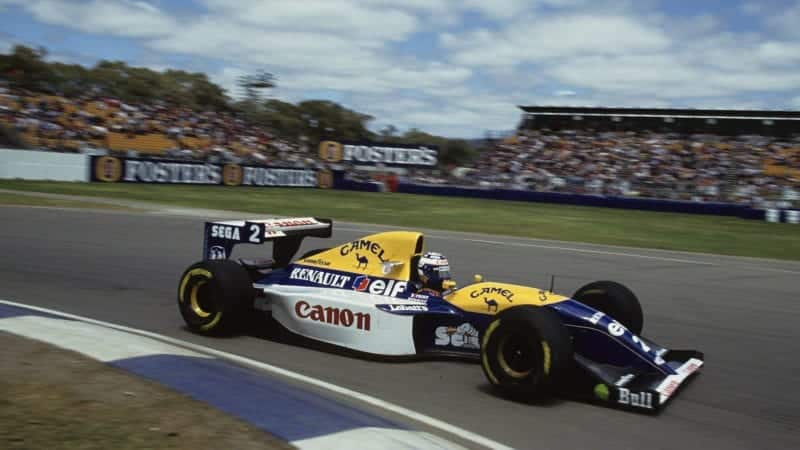
Prost’s 1993 masterclass was a turn-off for spectators
Gilles Levent/DPPI
It started badly when FIA president Max Mosley, niggled by Prost’s criticisms of the governing body during his year off, wrote to Williams questioning whether it was appropriate to grant a super-licence to a driver who had been out of the sport. The gross insult beggared belief and was an early example of the petty vindictiveness that would colour Mosley’s 18-year FIA reign. But more pertinently, it succeeded in unsettling Prost. Just to compound his frustration, Williams made an unfortunate clerical error by filing its world championship application two days late – just at a time when Mosley was on the campaign trail to ban its clever ‘gizmo’ technology. The president made the team sweat, then valiantly came to their ‘rescue’ in the lead-up to the first race. He was about to make his first start in one of the greatest F1 cars in history – but did Prost really need this?
He stuttered, then won (as he should have…) on his Williams debut in South Africa, then aquaplaned out of the lead at Interlagos, seemingly powerless to the will of destiny and the thrill of a Senna home win. Then came humiliation at Donington and his seven-stop nightmare in the drenched European Grand Prix. Somehow, it’s come to define his 1993 season, and only for those who love to denigrate him, even his career. But like all downfalls, there are extenuating circumstances, as Williams technical director Patrick Head has tried umpteen times to explain.
“We qualified first and second at Donington, but the active ride car ran very low, 2-3mm above the ground with its flat bottom,” says the Williams co-founder. “The problem was that the surface water was deeper than 2-3mm, so often Alain and Damon [Hill] were trying to steer the car using the front wheels as a rudder! I do not want to diminish a great drive from Ayrton, but in fact we hung a technical ‘ball and chain’ around our drivers’ necks that day. It was not really a ‘fair fight’.
“Alain was on pole by over 1.5 seconds [ahead of Michael Schumacher’s Benetton in third]. But I am very surprised that Damon finished second and Alain third, considering that Damon did six stops for tyres and Alain seven.”
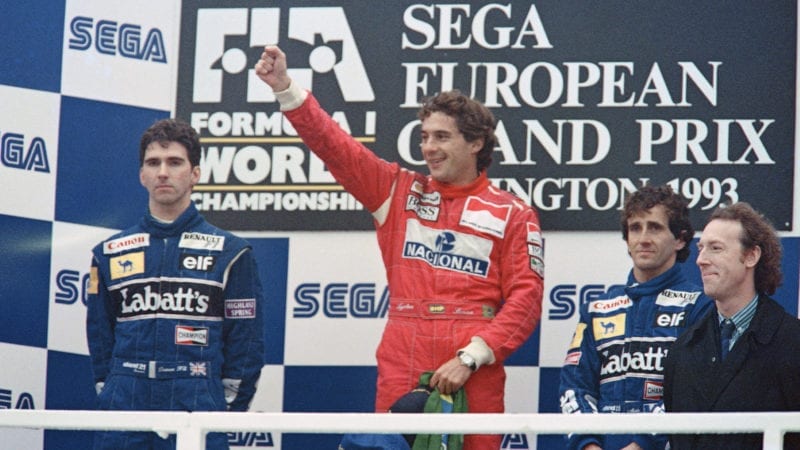
Donington 1993: the faces say it all
Pascal Pavani/AFP via Getty Images
But Head knows, as did Prost in the infamous post-race press conference, that he is whistling into the wind. No one wanted to hear excuses, no matter how relevant. Senna only rubbed it in by asking his greatest rival whether he wanted to switch cars, and with that Prost’s humiliation was complete. The season should have been his crowning glory, and it was – but at its end no wonder he was glad to be out of it.
These days Vettel doesn’t spend too much time trying to explain himself. Like Prost, perhaps he knows he’d be wasting his breath. But unlike Prost in 1992, Vettel faces one fundamental problem: he’s no longer in demand. Neither Mercedes nor Red Bull seem interested now, so why would they be for 2022 when the new regulations kick in? The risk for Vettel is a potential Aston Martin seat is probably as good as it’s going to get, and a sabbatical might end up turning into early retirement, as it did for Häkkinen.
Then again, even if Seb could engineer a remarkable comeback in a genuine, proven race-winning team, Prost’s example shows it wouldn’t necessarily make him happy or give him satisfaction anyway!
Four championships, 53 wins and the rest – but it can’t be easy being Sebastian Vettel right now. Alain Prost would understand.
